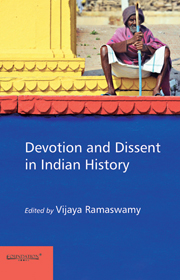Book contents
- Frontmatter
- Dedication
- Contents
- List of Tables and Figures
- Foreword
- Preface
- Introduction: Locating Devotion in Dissent and Dissent in Devotion A Thematic Overview
- Introduction
- 1 Parsing of Devotion and Dissent
- 2 Dissent and Protest in Early Indian Buddhism with Special Reference to Devadatta
- 3 Devotion and Dissent in Hunter's Bhakti
- 4 Devotion and Dissent
- 5 Dissent Within
- 6 Women in Love
- 7 Dissenting Voices
- 8 Dissent in Kabir and the Kabir Panth
- 9 Devotion and Dissent of Punjabi Dalit Sant Poets
- 10 Protest and Counter-protest
- 11 Fakirs of Bengal
- 12 Music in Chishti Sufism
- 13 Dissenting the Dominant
- 14 Devotion and Dissent within the Catholic Church in Late Colonial Bengal
- 15 Narratives of Travel, Voices of Dissent and Attacks on the Colonial Church Fabric of the European Missionaries
- 16 Devotion and Dissent in Narayana Guru
- 17 Sree Narayana Guru's Idioms of the Spiritual and the Worldly
- Contributors
- Index
11 - Fakirs of Bengal
from Introduction: Locating Devotion in Dissent and Dissent in Devotion A Thematic Overview
Published online by Cambridge University Press: 05 October 2014
- Frontmatter
- Dedication
- Contents
- List of Tables and Figures
- Foreword
- Preface
- Introduction: Locating Devotion in Dissent and Dissent in Devotion A Thematic Overview
- Introduction
- 1 Parsing of Devotion and Dissent
- 2 Dissent and Protest in Early Indian Buddhism with Special Reference to Devadatta
- 3 Devotion and Dissent in Hunter's Bhakti
- 4 Devotion and Dissent
- 5 Dissent Within
- 6 Women in Love
- 7 Dissenting Voices
- 8 Dissent in Kabir and the Kabir Panth
- 9 Devotion and Dissent of Punjabi Dalit Sant Poets
- 10 Protest and Counter-protest
- 11 Fakirs of Bengal
- 12 Music in Chishti Sufism
- 13 Dissenting the Dominant
- 14 Devotion and Dissent within the Catholic Church in Late Colonial Bengal
- 15 Narratives of Travel, Voices of Dissent and Attacks on the Colonial Church Fabric of the European Missionaries
- 16 Devotion and Dissent in Narayana Guru
- 17 Sree Narayana Guru's Idioms of the Spiritual and the Worldly
- Contributors
- Index
Summary
A History of Protest from Past to Present
Sumanta Banerjee
The rise of the fakirs, who come mostly from the Muslim community, was not an isolated phenomenon in the history of Bengali society and religion. They were a part of a wider constellation of numerous syncretistic religious sects that shone over the Bengali popular religious scene during the sixteenth to seventeenth century. They continued to thrive in rural Bengal through the British colonial period, and still survive in the villages of Bengal. These sects occupy a special position in the history of Bengali popular religion, creating a subculture of their own. One nineteenth century Bengali scholar, Akshay Kumar Dutta, listed some fifty-odd syncretistic sects, which flourished all over India during his lifetime, and which originated in the seventeenth to the eighteenth centuries. Among them, at least forty were found in Bengal alone.
The development and popularity of these syncretistic sects should be understood in a dual context: first, the socio-religious composition of Bengali society at the time of their birth; and second, the cultural tradition that continues down to the present times in rural society, where people require songs and music not only for entertainment but also for their deep spiritual needs.
To go back to the socio-religious past that gave birth to these sects and their songs, we should note that Bengali society at that time was occupied by the twin religious establishments: one ruled by the Brahmanical order according to strictly laid down hierarchical caste-bound norms for the Hindus; and the other by the ashrafs (Muslim aristocrats and clergy who claimed descent from the earlier Arab, Turkish, Afghan and Moghul settlers) for the Muslims.
- Type
- Chapter
- Information
- Devotion and Dissent in Indian History , pp. 255 - 273Publisher: Foundation BooksPrint publication year: 2014

